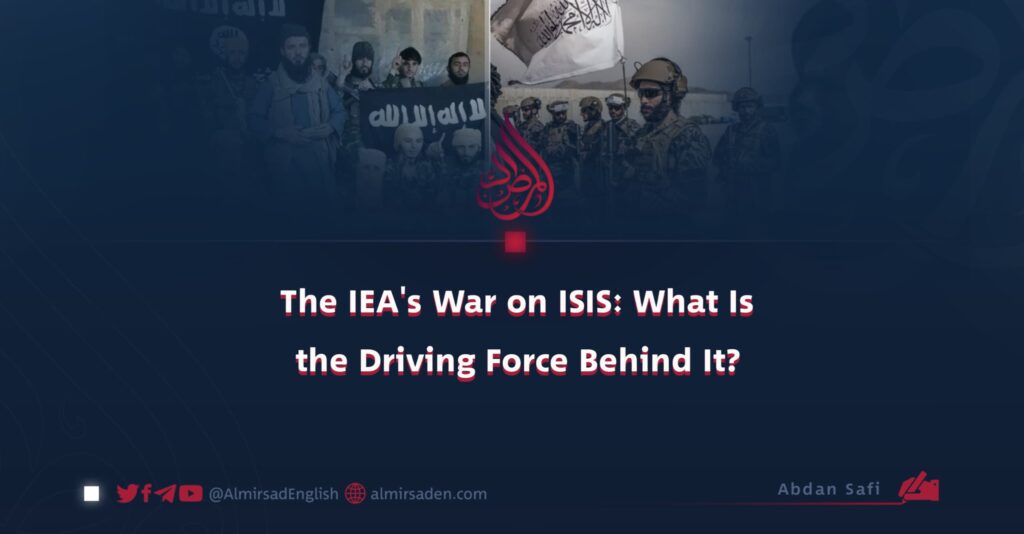Abdan Safi
In the wake of the U.S. House of Representatives passing a bill to halt aid to Afghanistan, certain media outlets and biased commentators have begun circulating unfounded claims suggesting that this decision might weaken the IEA’s efforts against ISIS. Whether born of ignorance or deliberate misinformation, such commentary bears no resemblance to reality. Rather, it seeks to distort the deeply rooted security, ideological, and societal dynamics of present-day Afghanistan.
The Islamic Emirate of Afghanistan (IEA) is not a foreign-imposed entity, but a grassroots Islamic movement that emerged from decades of struggle, dedicating over twenty years of sacrifice to ending occupation and establishing an Islamic system. In stark contrast, ISIS is an externally imposed, takfiri extremist group that was introduced into Afghanistan through intelligence networks following the conflicts in Iraq and Syria. Its aim is to ignite another wave of violent fitnah in the region.
From the IEA’s perspective, ISIS is a deviant Khariji faction devoid of Islamic legitimacy, religious justification, popular support, or scholarly consensus. It is a destructive force that fractures the unity of the Ummah, issues arbitrary takfir fatwas, and has committed grave atrocities, ranging from the assassination of scholars to the massacre of innocent civilians and children. Under the guise of Islam, ISIS has inflicted deep wounds on the very essence of the faith.
The IEA considers its war against ISIS not merely a security requirement, but a religious obligation, a national duty, and an existential necessity for the Afghan nation. The objective is to uproot the ideology of the Khawarij, an ideology that undermines unity, disrespects scholars, and disregards the collective interests of the Muslim Ummah. This is not a campaign waged for external funding or political legitimacy. Rather, it is a principled struggle to preserve the purity of Islam and honor the sacred legacy of the martyrs. The IEA engages in this battle solely for the pleasure of Allah Almighty, not for aid from Washington or any other external actor.
The IEA’s resolve in combating ISIS has been tested and proven. Even during the years when it had no formal governmental authority, national budget, international recognition, or foreign assistance, the IEA launched fierce and unrelenting operations against the Daeshi Khawarij. From the mountainous valleys of Nangarhar to the rugged terrain of Zabul, it dismantled their networks and sanctuaries. This effort was not sustained by military force alone, but by public support, religious guidance, and deep-rooted ideological conviction.
For the IEA, the fight against ISIS is an Islamic, national, religious, and moral imperative, not a reaction to foreign pressure or encouragement.
Moreover, the assertion that the suspension of U.S. aid will hinder the IEA’s anti-ISIS campaign is fundamentally flawed. This campaign was initiated while American forces were still present in Afghanistan, and it continued despite their presence. In fact, there are documented incidents where U.S. aircraft evacuated ISIS fighters from threatened areas or supported them militarily. Credible reports also reveal that advanced weapons and technologies, exclusive to U.S. special forces, found their way into the hands of ISIS militants. These facts reaffirm that the IEA’s war against ISIS is driven not by foreign financial assistance, but by internal capability, intelligence proficiency, principled determination, and broad popular support.
The Afghan people, including scholars, tribal elders, youth, and citizens alike, harbor a deep and instinctive rejection of ISIS. Its ideology is alien, brutal, and fundamentally incompatible with Afghan values and Islamic teachings. The IEA embodies the will, voice, and leadership of the Afghan nation. Accordingly, its war against ISIS is not tethered to foreign funding but rooted in the hearts, faith, and convictions of its people.
If the United States chooses to halt aid, that is its political decision. But such a move will never diminish the ideological resolve, popular support, or religious commitment of the IEA. On the contrary, it will only strengthen the IEA’s independence, reinforce its stability, and consolidate a self-reliant system grounded in the trust and support of its own people.
Let it be clearly understood: the war between the IEA and ISIS is a battle of faith, a struggle for survival, and a campaign for the unity and salvation of the Muslim Ummah. It is not a conflict waged for funding, fame, or political stature. It is a confrontation between the true adherents of La ilaha illallah and the deviant Khawarij. This battle shall continue until fitnah is eliminated and the religion belongs wholly to Allah.
